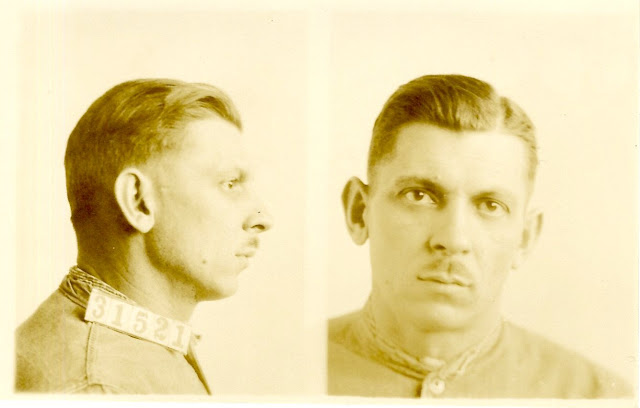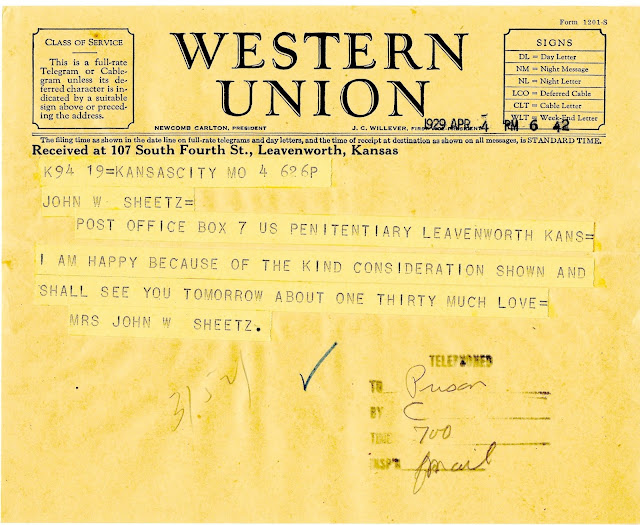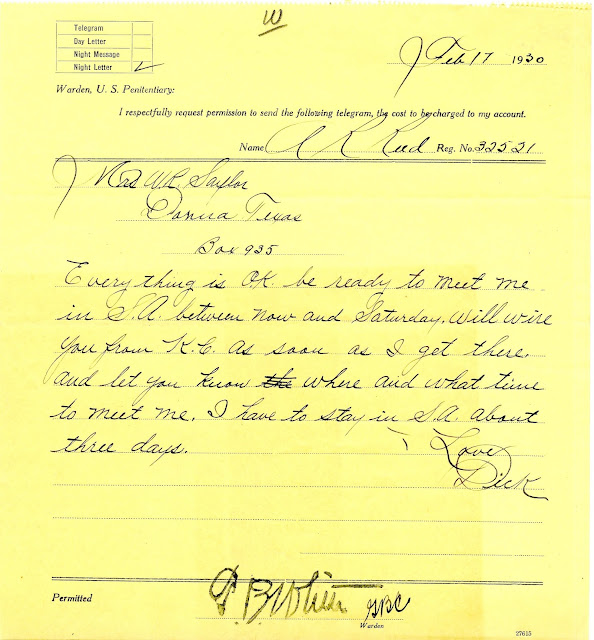John William Scheetz was born 16 NOV 1891 Harrisburg, Pennsylvania, USA to Lindlay William Sheetz (1851-) and Elizabeth Catherine Fry (1849-1910).
Inmate: #31521 Leavenworth Federal Prison
Rec: 15 Jan 1929
Crime: Volstead Act (Prohibition)
Term: 14 months
I found all his Leavenworth prison records online at the National Archives. I made him a tree. Here is his story.
He Married on
14 Sep 1913, in Dubuque, Iowa, USA
To
Blanche M Hall
1898–1968
They had the following children:
Marion K Sheetz
1917–
Lindlay William Sheetz
1917–1997
John James Sheetz
1919–1999
Catherine Sheetz
1921–1985
Found some telegrams in his prison records that are very interesting.
I wonder who Mrs. Saylor was
Why did he sign this DICK??? Did he have an alias???
He did service our country during WWI, this is all I found for his service:
Name: John William Sheetz
Report Year: 1917-1918
Service State: Ohio
When he got of prison he went home to his wife in Julien, Dubuque, Iowa, USA, he was working as a Commercial Salesman in Industry Auto Accessories. They had 3 children living at home. In 1940 the family moves to Shelby, La Crosse, Wisconsin, He was working as a
Proprietor. He married second 11 May 1965, Steele, Minnesota, USA to Mary L Vaughn 1940–1998.
John William Sheetz died 5 Oct 1984 in La Crosse, La Crosse, Wisconsin, USA.
I wonder what kind of man he was, in this photo he looks hard and rough, was it because he had such a hard life? Did he have other criminal records? Was he a good father? I sure hope so.
On March 22, 1933, President Franklin Roosevelt signed into law the Cullen–Harrison Act, legalizing beer with an alcohol content of 3.2% (by weight) and wine of a similarly low alcohol content. On December 5, 1933, ratification of the Twenty-first Amendment repealed the Eighteenth Amendment.
Alcohol Prohibition Was a Failure. National prohibition of alcohol (1920-33) — the "noble experiment" — was undertaken to reduce crime and corruption, solve social problems, reduce the tax burden created by prisons and poorhouses, and improve health and hygiene in America.
The movement reached its apex in 1920 when Congress ratified the 18th Amendment, prohibiting the manufacture, transportation and sale of intoxicating liquors. ... In 1933, widespread public disillusionment led Congress to ratify the 21st Amendment, which repealed Prohibition.
On December 5, 1933, the 21st Amendment to the United States Constitution was passed, repealing the 18th Amendment and ending the prohibition of alcohol in America. The 18th Amendment was passed in 1919 to ban the "manufacture, sale, or transportation of intoxicating liquors…for beverage purposes."
Inmate: #31521 Leavenworth Federal Prison
Rec: 15 Jan 1929
Crime: Volstead Act (Prohibition)
Term: 14 months
Out of all the things we have done as a Government I will never understand this one.
He Married on
14 Sep 1913, in Dubuque, Iowa, USA
To
Blanche M Hall
1898–1968
They had the following children:
Marion K Sheetz
1917–
Lindlay William Sheetz
1917–1997
John James Sheetz
1919–1999
Catherine Sheetz
1921–1985
Found some telegrams in his prison records that are very interesting.
Seem he had some women problems, this is not his wife, I did not find any other information for her.
I wonder who Mrs. Saylor was
Why did he sign this DICK??? Did he have an alias???
He did service our country during WWI, this is all I found for his service:
Name: John William Sheetz
Report Year: 1917-1918
Service State: Ohio
Proprietor. He married second 11 May 1965, Steele, Minnesota, USA to Mary L Vaughn 1940–1998.
John William Sheetz died 5 Oct 1984 in La Crosse, La Crosse, Wisconsin, USA.
I wonder what kind of man he was, in this photo he looks hard and rough, was it because he had such a hard life? Did he have other criminal records? Was he a good father? I sure hope so.
On March 22, 1933, President Franklin Roosevelt signed into law the Cullen–Harrison Act, legalizing beer with an alcohol content of 3.2% (by weight) and wine of a similarly low alcohol content. On December 5, 1933, ratification of the Twenty-first Amendment repealed the Eighteenth Amendment.
Alcohol Prohibition Was a Failure. National prohibition of alcohol (1920-33) — the "noble experiment" — was undertaken to reduce crime and corruption, solve social problems, reduce the tax burden created by prisons and poorhouses, and improve health and hygiene in America.
The movement reached its apex in 1920 when Congress ratified the 18th Amendment, prohibiting the manufacture, transportation and sale of intoxicating liquors. ... In 1933, widespread public disillusionment led Congress to ratify the 21st Amendment, which repealed Prohibition.
 |
| John-A-Leach-New-York-City-agents-1920 |
On December 5, 1933, the 21st Amendment to the United States Constitution was passed, repealing the 18th Amendment and ending the prohibition of alcohol in America. The 18th Amendment was passed in 1919 to ban the "manufacture, sale, or transportation of intoxicating liquors…for beverage purposes."














































The last 2 penitentiary slides you have, do not belong to John Sheetz prisoner #31521, they belong to prisoner #32521. That's why there was confusion over Mrs. Saylor and Dick. John Sheetz is my son in law's great grandfather. Thank you for all the information! You did a great job finding information on him.
ReplyDeleteI believe it says his name on them and the number is circled so they must of known it was the wrong number. Thank you for your comment.
Delete